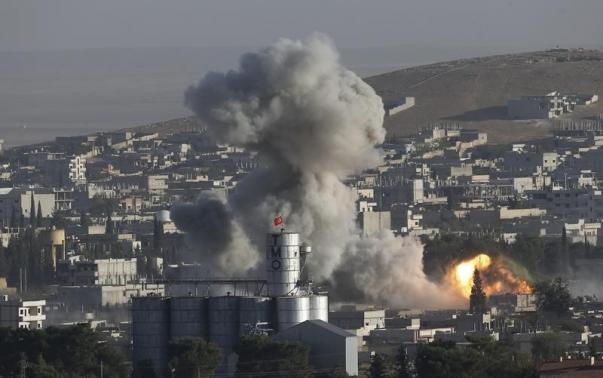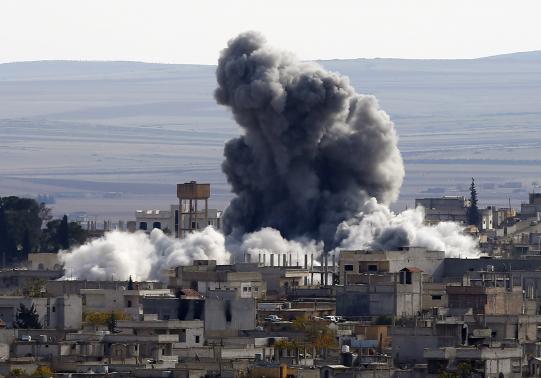www.aljazeerah.info
News, December 2014
Archives
Mission & Name
Conflict Terminology
Editorials
Gaza Holocaust
Gulf War
Isdood
Islam
News
News Photos
Opinion Editorials
US Foreign Policy (Dr. El-Najjar's Articles)
www.aljazeerah.info
|
Editorial Note: The following news reports are summaries from original sources. They may also include corrections of Arabic names and political terminology. Comments are in parentheses. |
1,171 Sunni Muslim Arabs Killed in US-Led Air Strikes on Iraq and Syria
December 23, 2014
Editor's Note:
No matter what spins or selective information the corporate media uses to justify the US-led air strikes on Iraq and Syria, ultimately these strikes strengthen the sectarian corrupt regimes in Syria and Iraq and help these brutal dictatorial regimes to subjugate the Sunni Muslim Arab population in Syria and Iraq.
 |
 |
| US air strike on Syrian city of Kobani-Ayn Al-Arab, November 2014 |
Ten more strikes hit Islamic State in Syria, Iraq: U.S. military
WASHINGTON, Tuesday, Dec 23, 2014 8:56am EST
(Reuters) -
The U.S.-led coalition fighting Islamic State in Syria and Iraq launched 10 more strikes against the militants on Tuesday, destroying various fighting positions, the U.S. military said in a statement.
The seven strikes in Syria and three in Iraq also struck a unit of Islamic State fighters as well as some of the militants' oil collection equipment, according to the Combined Joint Task Force for the operation.
Over 1,000 Islamist militants killed in U.S. strikes in Syria: monitor
AMMAN, Tuesday, Dec 23, 2014 8:28am EST
(Reuters) -
Three months of U.S.-led strikes in Syria have so far killed at least 1,171 people, mostly Islamic State militants, a British-based Syrian monitoring group said on Tuesday.
Rami Abdulrahman, the head of the Syrian Observatory for Human Rights, told Reuters only 52 were civilians. But his network of activists, who are based around Syria, said the death toll since the military campaign was launched in late September was probably higher among hardline Islamist insurgents.
"This is because of the difficulty of activists reaching areas hit by the coalition and also because the Islamic State keeps a tight lid on it's human losses," Abdulrahman said.
The United States and its allies have significantly scaled down their air strikes in Syria since late September compared to the first month of the campaign.
In total, the United States carried out 488 air strikes in Syria through Dec. 15, according to U.S. military data published by Reuters. The Observatory figures do not include casualties from air strikes on Islamic State targets in Iraq.
(Reporting by Suleiman Al-Khalidi; Editing by Alison Williams)
Twin blows to IS group as Kurds break Mount Sinjar siege
FRANCE 24 with AFP, REUTERS,
December 23, 2014 -
Airstrikes in Iraq have killed three leaders of the Islamic State (IS) group in recent weeks, the US said Thursday, while Iraqi Kurds said they had broken a siege on a mountain where Yazidi civilians and fighters have long been trapped by IS forces.
Officials said the twin successes dealt heavy blows to IS's command and control as well as their supply lines, and were the latest in a string of apparent setbacks for the group in recent weeks.
In an interview with the Wall Street Journal, chairman of the US Joint Chiefs of Staff General Martin Dempsey said three senior leaders of the group had been killed in US-led airstrikes as part of expanding effort with partner nations to combat the militants.
"These are high-value targets, senior leadership," Dempsey told the Journal.
The newspaper, quoting unnamed officials, said between December 3 and December 9, air raids killed a man known as Abd al-Basit, the head of the group's military operations in Iraq, and Haji Mutazz, a deputy to Islamic State group leader Abu Bakr al-Baghdadi.
A third figure, Radwan Talib, the IS group's leader overseeing the city of Mosul, was killed in a strike in late November, the Journal reported.
An unnamed US defence official separately told AFP that several IS group leaders had been killed in northern Iraq in recent weeks.
"These were the result of a series of air strikes this month carried out over the course of several days," the official told AFP on condition of anonymity.
"We've long said that command and control, including leadership, remain valid targets," the official said.
Mount Sinjar siege broken
Meanwhile, Iraqi Kurds said Thursday that they had ended a longstanding IS siege on northern Iraq’s Mount Sinjar, following a two-day blitz involving 8,000 peshmerga fighters and some of the heaviest air strikes since a US-led coalition started an air campaign four months ago.
"Peshmerga forces have reached Mount Sinjar, the siege on the mountain has been lifted," Masrour Barzani, the son of the Kurdish president and the intelligence chief for the Iraqi autonomous region told reporters from an operations centre near the border with Syria.
A devastating IS attack on the Yazidi minority's Sinjar heartland in August displaced tens of thousands of people and was one of the reasons put forward by US President Barack Obama for launching an air-strike campaign in September.
Amid fears of genocide against the small Kurdish-speaking minority, tens of thousands of Yazidis fled to the mountain and remained trapped there in the searing summer heat with no supplies.
Kurdish fighters, mostly Syrian, broke that first siege but remaining anti-IS forces were subsequently unable to hold positions in the plains and retreated back to the mountain in late September.
The peshmerga commander for the area said troops had reached the mountain and secured a road that would enable people to leave, effectively breaking the siege. Several thousand are still thought to be trapped there.
"Tomorrow most of the people will come down from the mountain," Mohamed Kojar told AFP by phone, explaining the offensive had secured a corridor northeast of the mountain.
Tide turning
The peshmerga said they recaptured eight villages on the way and killed about 80 IS fighters in the initial phase of the offensive launched from Rabia on the Syria border and Zumar on the shores of Mosul Lake.
Kurdish officials said the operation had dealt the jihadists a blow by cutting their supply lines and forcing them to retreat to urban bastions such as Tal Afar and Mosul, their main hub.
(Sunni Muslim Arab fighters) still control the town of Sinjar, on the southern side of the mountain, and many of the surrounding villages, however.
The IS group proclaimed a "caliphate" over parts of Iraq and Syria nearly six months ago after sweeping through Iraq's Sunni heartland and throwing the country into chaos.
A second wave of attacks in August against Sinjar and towards the borders of Kurdistan triggered a US intervention that has now grown into a 60-nation anti-IS coalition.
The strikes were extended into Syria on September 23.
The military fightback appears to have gradually turned the tide on the jihadists, who have suffered a string of setbacks in Iraq in recent weeks.
Battle lines are more static in Syria, where the West is not coordinating its air campaign with the regime.
***
Share this article with your facebook friendsFair Use Notice
This site contains copyrighted material the
use of which has not always been specifically authorized by the copyright
owner. We are making such material available in our efforts to advance
understanding of environmental, political, human rights, economic,
democracy, scientific, and social justice issues, etc. We believe this
constitutes a 'fair use' of any such copyrighted material as provided for
in section 107 of the US Copyright Law. In accordance with Title 17 U.S.C.
Section 107, the material on this site is
distributed without profit to those
who have expressed a prior interest in receiving the included information
for research and educational purposes. For more information go to: http://www.law.cornell.edu/uscode/17/107.shtml.
If you wish to use copyrighted material from this site for purposes of
your own that go beyond 'fair use', you must obtain permission from the
copyright owner.
|
|
|
|
||
|
||||||


